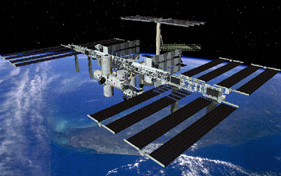This image is an artist's conception of how the ISS will look when it is completed in 2003. The Station will be powered by almost an acre of of solar panels and will weigh almost 1 million pounds!
Click on image for full size
Image courtesy of NASA
International Space Station - Hopefully Coming Soon!
News story originally written on September 16, 1998
Well, the good news is that the first module of the International Space Station (ISS) is still on schedule for launch this November. The second U.S.-built module named Unity will launch in December.
Ready for the bad news? The living quarters module of the ISS which is being built by the Russia Space Agency is still not complete. Spokesman Sergei Gorbunov said, "Financial delays are the reason." As Russia's economy continues to melt down, more and more delays will be felt by the ISS project.
The first crew of the ISS was to be on board by July of 1999. Now it is likely that the first crew won't be in place until sometime in 2000. At this point, all we can do is wait and see.
Although the ISS draws heavily upon the resources of Russian and the U.S., it certainly relies on the expertise of 14 other countries. It remains the largest and most comprehensive international scientific endeavor.
You might also be interested in:
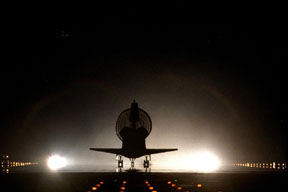
The space shuttle Discovery made a successful landing during the early hours of June 6, 1999. The night landing was only the 11th of its kind in 94 flights. The highlights of the mission include attaching
...more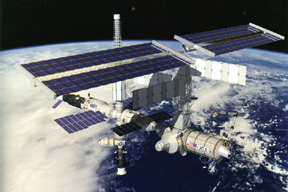
Now that the pieces to the International Space Station are getting put together, the satellite can be seen in the sky. The ISS appears to be a star, second in brightness only to Venus. If the sky is clear,
...more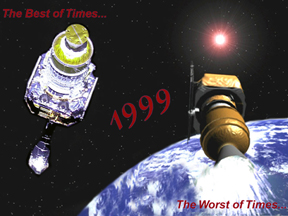
It was another exciting and frustrating year for the space science program. It seemed that every step forward led to one backwards. Either way, NASA led the way to a great century of discovery. Unfortunately,
...more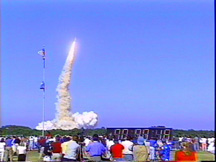
The Space Shuttle Discovery lifted off from Kennedy Space Center at 2:19 p.m. EST, October 29th. The sky was clear and the weather was great as Discovery took 8 1/2 minutes to reach orbit for the Unitied
...more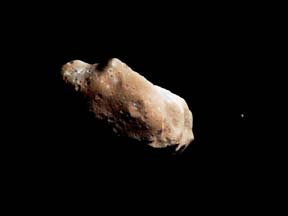
A moon was discovered orbiting the asteroid, Eugenia. This is only the second time in history that a satellite has been seen circling an asteroid. A special mirror allowed scientists to find the moon
...more
Will Russia ever put the service module for the International Space Station in space? NASA officials are demanding an answer from the Russian government. The necessary service module is currently waiting
...more
During a period of about two days in early May, 1998, the ACE spacecraft was immersed in plasma associated with a coronal mass ejection (CME). The SWICS instrument on ACE, which determines unambiguously
...more


